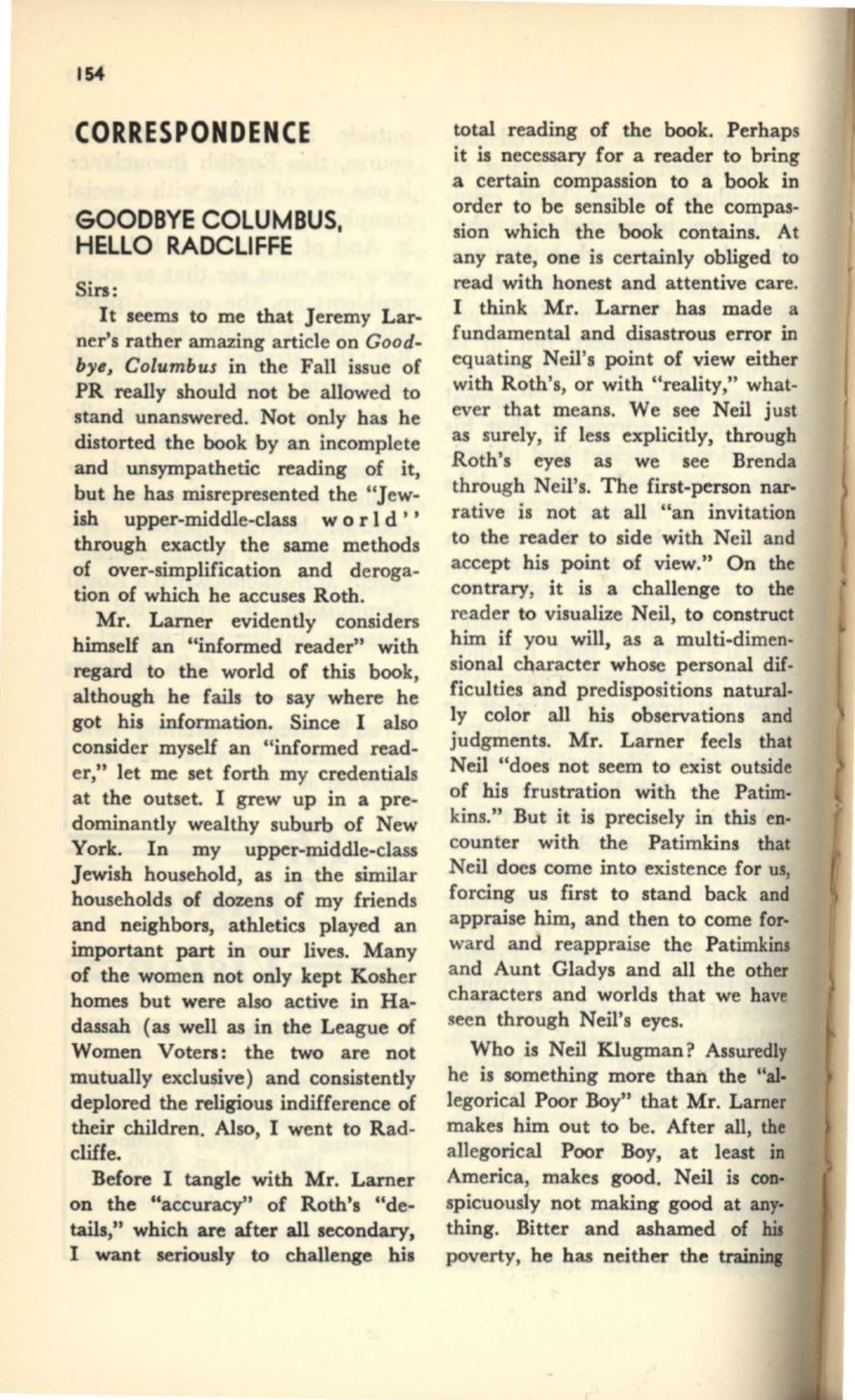
1504
CORRESPONDENCE
GOODBYE COLUMBUS,
HEllO RADCLIFFE
Sirs:
It seems to me that Jeremy Lar–
ner's rather amazing article on
Good–
bye, Columbus
in the Fall issue of
PR reaIly should not be allowed to
stand unanswered. Not only has he
distorted the book by an incomplete
and unsympathetic reading of
it,
but he has misrepresented the "Jew–
ish upper-middle-class w
0
rid' ,
through exactly the same methods
of over-simplification and deroga–
tion of which he accuses Roth.
Mr. Lamer evidently considers
himself an "informed reader" with
regard to the world of this book
although he fails to say where
h~
got his information. Since I also
consider myself an "informed read–
er," let me set forth my credentials
at the outset. I grew up in a pre–
dominantly wealthy suburb of New
York. In my upper-middle-class
Jewish household, as in the similar
households of dozens of my friends
and neighbors, athletics played an
important part in our lives. Many
of the women not only kept Kosher
homes but were also active in Ha–
dassah (as well as in the League
of
Women Voters: the two are not
mutually exclusive) and consistently
deplored the religious indifference of
their children. Also, I went to Rad–
cliffe.
Before I tangle with Mr. Larner
on the "accuracy" of Roth's "de–
tails," which are after all secondary,
I want seriously to challenge his
total reading of the book. Perhaps
it is necessary for a reader to bring
a certain compassion to a book in
order to be sensible of the compas–
sion which the book contains. At
any rate, one is certainly obliged to
read with honest and attentive care.
I think Mr. Larner has made a
fundamental and disastrous error in
equating Neil's point of view either
with Roth's, or with "reality," what–
ever that means. We see Neil just
as surely,
if
less explicitly, through
Roth's eyes as we see Brenda
through Neil's. The first-person nar–
rative is not at all "an invitation
to the reader to side with Neil and
accept his point of view." On the
contrary, it is a challenge to the
reader to visualize Neil, to construct
him if you will, as a multi-dimen–
sional cQaracter whose personal dif–
ficulties and predispositions natural–
ly color all his observations and
judgments. Mr. Larner feels that
Neil "does not seem to exist outside
of his frustration with the Patim–
kins." But
it
is precisely in this en–
counter with the Patimkins that
Neil does come into existence for us
forcing us first to stand back and
appraise him, and then to come for–
ward and reappraise the Patimkins
and Aunt Gladys and all the other
characters and worlds that we have
seen through Neil's eyes.
Who is Neil Klugman? Assuredly
he is something more than the
"al–
legorical Poor Boy" that Mr. Larner
makes him out to be. After all, the
aIlegorical Poor Boy, at least in
America, makes good. Neil is con–
spicuously not making good at any–
thing. Bitter and ashamed of
his
poverty, he has neither the
training


